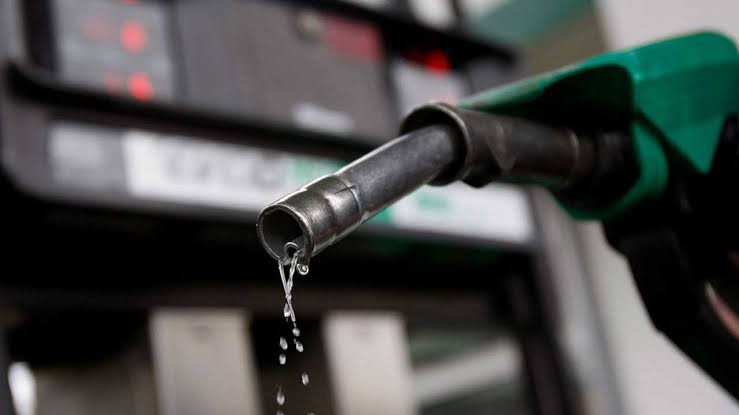The rebound in crude oil price as well as the inability of the Federal Government to fix the nation’s refineries may make it difficult for Nigerians to buy Premium Motor Spirit at a reduced price, THE WHISTLER has learnt.
With the removal of fuel subsidy, oil prices within the last three months have been on an upward trend.
Advertisement
The Federal Government had in April finally bowed to long-standing pressure to restructure the downstream segment of the Nigerian oil industry through the removal of fuel subsidy and introducing a total deregulation of the sector.
The government said the development became imperative, due to the fact that the rich, rather than ordinary Nigerians are the largest beneficiary of fuel subsidy payment.
The Petroluem Products Marketing Company had in the beginning of this month increased the ex-depot price of PMS to N138.62 per litre in a statement signed by the Manager of Sales, Mohammed Bello.
As of June this year, the ex-depot price band was N102.13 and N104.13 per litre, while ex-depot price band for marketers’ collection was N109.78 and 111.78 per litre.
Advertisement
The N138.62 ex depot price for August had made oil marketers to adjust their PMS pump price to N148.5 this month from N143.50 in July.
In June, the Federal Government adjusted the pump price of petrol upward by 16 per cent from N140.80 per liter to N143.80 per litre
Earlier in April this year, the Federal Government had announced a reduction of product to N123.50 per litre.
However there are concerns that with the continuous increase in the international price of crude oil, Nigerians may continue to experience an upward trend in the price of PMS.
Crude oil price had risen from about $35 per barrel which it sold in May to about $45 per barrel this month.
Advertisement
While there had been insinuations that the price of PMS may reduce if the government had been able to fix the nation’s refineries and get them functioning again, Stakeholders in the oil sector have expressed contrary view.
Speaking in an exclusive interview with THE WHISTLER, the Executive Secretary/ Chief Executive Officer, Major Oil Marketers Association of Nigeria, MOMAN, Mr. Clement Isong said that even if the refineries in the country were all functional, the price of PMS may still rise except the government returns to fuel subsidy regime.
He said, “The price will remain the same. crude oil is currently going at $45 per barrel, except you want to undermine the cost of your own crude and you start selling it to yourself at $30 or $25.
”Currently we are selling fuel around N148 per litre, across the border is around N300 which is not encouraging,anything below that price you are subsidizing.”
However, he stated that the problem in Nigeria is that of lack of trust, adding that Nigerians do not believe in the sincerity of government.
He added, “Under normal circumstances, people are supposed to pay the correct price and then government uses the money it has saved from subsidy to provide services to Nigerians.
Advertisement
”There are other areas that subsidy are more useful. For example, in areas of education, infrastructure, healthcare etc. But spending the money on fuel they are just burning it because there’s no return of investment.”
Isong urged the government to come up with measures to mitigate the negative impact of high petroleum product price on Nigerians.
He said, “The solution is to bring down food prices, the solution is to bring down transportation cost by investing in mass transport, the solution is to encourage alternative means of PMS which is what they’re talking about with the Compressed Natural Gas which is cheaper. ”
The Minister of State for Petroleum Resources, Timipre Sylva, had said that the government was mindful of the likely impact higher PMS prices would have on Nigerians, adding that to alleviate this, the government was working very hard to roll out the auto-gas scheme.
This, he stated, would provide Nigerians with alternative sources of fuel and at a lower cost.
According to Sylva, when crude oil prices were down, government, through its regulatory functions ensured that the benefits of lower crude oil prices were enjoyed by Nigerians by ensuring that PMS price was lowered.
He added that at that time, the government indicated that increase in crude oil prices would also reflect at the pumps.
He blamed fuel subsidy for the low refining capacity in the country, noting that subsidy made it impossible to attract the much-needed investments into the refining sector.
He said, “This is a necessary action taken by a responsible government in the overall interest of Nigerians. Indeed, one of the reasons we have been unable to attract the level of investments we desire into the refining sector has been the burden of fuel subsidy.
“We need to free up that investment space so that what happened in the banking sector, aviation sector and other sectors can happen in the midstream and downstream oil sector.
“We can no longer avoid the inevitable and expect the impossible to continue. There was no time Government promised to reduce pump price and keep it permanently low.”



